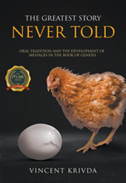
 |
The Greatest Story Never Told: Oral Tradition and the Development of Messages in the Book of Genesis
by Vincent Krivda
Writers Republic
The first five books of the Bible, often referred to as the Torah, meaning "to teach," are presumed to have been written by Moses. But there are numerous episodes in these books that contain direct contradictions, such as how many animals were to be taken on Noah's ark. Many passages are confusing, indeed inexplicable, if one imagines them to have been composed by a single author setting down factual material. Yet believers trust that their sacred texts are true. So how can one resolve these apparent inconsistencies?
Author Krivda introduces his topic by citing the words of Jesus that seemingly correct the teachings of the Torah about God's commands. For example, Jesus states that "You have heard that it was said that 'You shall love your neighbor and hate your enemy,'" and then urges his followers to love their enemies. Yet Krivda points out that in the book of Leviticus, God clearly tells his followers not to take vengeance or bear any grudge. The conclusion Krivda draws is that Jesus was quoting from popular oral tradition and that, in the main, the Torah was created from such openly discussed, topical issues and other unwritten guidance.
He explores these possibilities by looking first at the lives of ordinary people in Old Testament times, showing that family—mishpacha, or clan—was the center of most lives. He suggests that much religious tradition arose as families discussed the stories they had been taught at a time when there were no written doctrines, and buildings or denominations did not confine religion. He goes on to detail many key episodes in the life of Abraham and his son Isaac, showing them to be devoutly obedient to God's commands, but, in certain situations, simply able to act on their own in apparent, but humanly understandable, contradiction to those commands.
Krivda, with many years of writing experience in the context of business contracts, and a career pathway in the teaching of both religious history and finance, combines his broad areas of erudition in this intensely focused, scholarly thesis. His viewpoint is supported by a wealth of historical, linguistic, and geographical data that is plainly stated to evoke the reader's curiosity by its evident credibility. Krivda provides an intellectually sound and engaging message for readers at any level. This latter aspect is mainly accomplished through enjoyable and frequently amusing anecdotes from his own family life. He invites his audience to consider that when people relate a story, joke, or memory, they use their own wording. The better they tell something, the longer it will survive.
Furthermore, one can accept slightly differing, or newly minted, versions of the same scenario, just as one does in any lively, open-minded discussion. Those who experienced the events depicted in the Torah would have given them their own interpretations, sometimes even recording different viewpoints without problem or prejudice. Krivda's diligent examination of these unusual but rational issues should make rich fodder for Bible studies. It may even prompt families and other small groups to initiate their own discussion sessions and find new insights regarding the Torah and its gifts for new generations.
RECOMMENDED by the US Review.